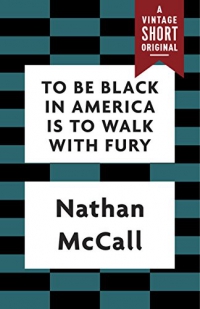
Published digitally by Vintage as a "Vintage Short" on February 23, 2016
Nathan McCall’s essay on “America’s contempt and utter disregard for black life” is timely, given the recent election's reminder that white supremacy is still advocated by a good many of the Angry White Men who are hostile to racial harmony and equal rights for all. Reflections on racism will always be timely as long as racism exists, but the Black Lives Matter movement and the bitter climate of Trump's election make McCall’s observations resonate.
Twenty years ago, McCall wrote Makes Me Wanna Holler, describing his transition from prison inmate to journalist. A part of the essay updates readers of Makes Me Wanna Holler about how McCall’s life turned out. I suspect that part will be of greater value to those who read his book than those who did not. I’m in the latter group.
McCall maintains that little has changed in the intervening decades, in that many white Americans continue to believe that the United States belongs to white people and “are willfully blinded to the depth and breadth of its racial pathology.” Those are the whites who are “America’s greatest racial tormenters and, at the same time, the most tortured victims of their own propaganda.” There is certainly truth in those statements, even if they are a bit too sweeping.
Of course, America has changed, as the election of a black president reflects, a monumental event that McCall does not acknowledge in the first two-thirds of his essay. When he does, he says, “Even when a black man reaches the very pinnacle of power, he’s still considered a nigger.” By some, yes, but if that were universally true, Obama would never have been elected and reelected. I understand McCall’s howl of pain, but I don’t think it excuses blanket statements that distort reality.
I also don’t buy McCall’s subtext. Part of McCall’s anger comes from his struggle to overcome a past that includes felony convictions for crimes he readily admits he committed. The subtext is that racism caused him to commit those crimes. Well, maybe, but an awful lot of black people manage to confront or cope with racism without committing robberies and assaults.
There is nevertheless much of value in this essay, thoughts that merit attention, even if McCall’s observations aren’t new or novel. McCall touches upon the myth of American meritocracy, crime as a leveling force that provides a route to economic equality, the enduring stain of racism even among educated whites, the disconnect between white and black perceptions of racial realities, the failure of history classes to convey the horror of black oppression, and the disproportionate imprisonment of black men to feed a prison system that gives disproportionate employment to white workers. He also discusses lessons he learned in South Africa that apply to racial experience in America. All of those issues, which a brief essay can only touch upon, are compelling, making the essay as a whole a worthwhile read.
RECOMMENDED